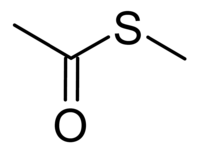Chemistry:S-Methyl thioacetate
From HandWiki

| |
| Identifiers | |
|---|---|
3D model (JSmol)
|
|
| ChEBI | |
| ChemSpider | |
PubChem CID
|
|
| UNII | |
| |
| |
| Properties | |
| C3H6OS | |
| Molar mass | 90.14 g·mol−1 |
Except where otherwise noted, data are given for materials in their standard state (at 25 °C [77 °F], 100 kPa). | |
| Infobox references | |
Tracking categories (test):
S-Methyl thioacetate is a natural product found in many plant species. In its pure form it has an unpleasant sulfurous smell, but when highly diluted and along with other simple alkyl thioacetates and related compounds, it is an important component of the smell and flavour profile of some foods, especially Camembert cheese.[1][2]
Alternate isomer

O-methyl ethanethioate, CAS# 21119-13-1[3]
The constitutional isomer in which the oxygen and sulfur atoms are interchanged, O-methyl thioacetate, is also commonly known as methyl thioacetate and found as a natural product and flavor component in some foods, such as fish sauce and some kinds of melon.[4][5]
See also
References
- ↑ "Current knowledge of soft cheeses flavor and related compounds". Journal of Agricultural and Food Chemistry 47 (12): 4825–36. December 1999. doi:10.1021/jf990414f. PMID 10606538.
- ↑ "Methionine metabolism: major pathways and enzymes involved and strategies for control and diversification of volatile sulfur compounds in cheese". Critical Reviews in Food Science and Nutrition 53 (4): 366–85. 2013. doi:10.1080/10408398.2010.536918. PMID 23320908.
- ↑ "Methyl thioacetate". PubChem. U.S. National Library of Medicine. https://pubchem.ncbi.nlm.nih.gov/compound/519840.
- ↑ Shimoda, M.; Yamamoto, Y.; Cocunubo-Castellanos, J.; Yoshimura, T.; Miyake, M.; Ishikawa, H.; Osajima, Y. (2000). "Deodorization of Fish Sauce by Continuous-Flow Extraction with Microbubbles of Supercritical Carbon Dioxide". Journal of Food Science 65 (8): 1349–1351. doi:10.1111/j.1365-2621.2000.tb10610.x.
- ↑ "Aroma volatiles as biomarkers of textural differences at harvest in non-climacteric near-isogenic lines of melon.". Food Research International 54 (2): 1801–1812. December 2013. doi:10.1016/j.foodres.2013.09.031.
 |

